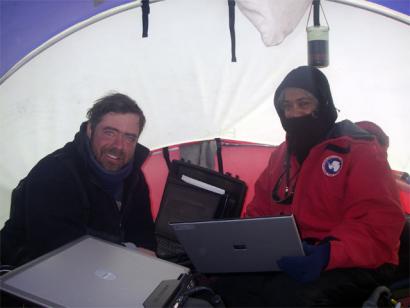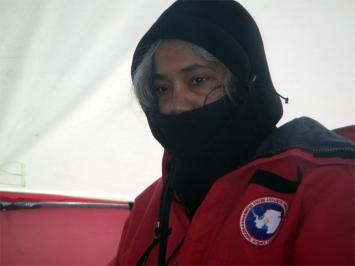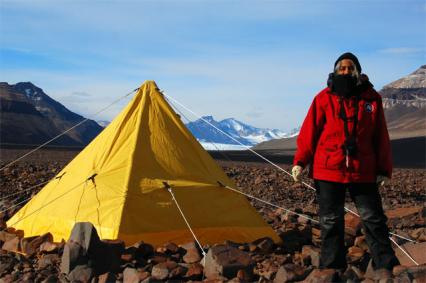When I applied to the PolarTREC program, I was asked where I would prefer to go given the options of the Arctic, Antarctica, or either. I checked the Antarctica box only, despite the fact that I may have decreased my chances of being selected. Antarctica was my preference for many reasons. As a teacher I felt that Antarctica represented the last frontier to study the geologic history of the planet because the continent is uninhabited, not polluted, and restricted to pure research. Over the last few years I have noticed that my students were very concerned with global climate change and based their opinions primarily on media information and misinformation, and not on science. I thought following me on this trip would open their eyes to the process of the scientific method and what it takes to acquire reliable data. On a personal level, I wanted to visit a unique environment that very few people in the world will ever see.
My experience as a PolarTREC teacher was unique, and took a few twists and turns before I actually left for Antarctica. I was originally selected by the CReSIS (Center for Remote SensingThe scanning of the earth by satellite or high-flying aircraft in order to obtain information about it. of Ice Sheets) project which has headquarters at the University of Kansas. I met and spent a few days visiting the team at the University of Kansas and had dinner at the Principal Investigator's home with other team members. We were all pleased with the match and looked forward to working together.
In the late summer of 2008, I was informed that the project was cancelled and that I would be assigned to another research team. Although I was philosophical regarding the change and rationalized that it was meant to be, I was totally stressed. I like to be well prepared and organized, almost to a fault, and I didn't know how the experience of camping in a remote location with people whom I have never met would turn out. PolarTREC teachers have an active network, and I had already heard some horror stories. What if they didn't like me or if the Principal Investigator did not want to be bothered?

Fortunately I was "adopted" by Dave Marchant of Boston University who has been conducting research in Antarctica for over twenty years. The goals and details regarding his science research are well documented in my journal (Buried Antarctica Ice Sheets), so I would like to focus on how the research experience affected me.
We worked in a remote field camp in Beacon Valley, Antarctica. Access to the camp was by helicopter only and any water used in the camp was collected from nearby snow banks. I summoned my "inner child" geology student from many years ago to deal with the challenges of primitive camping.
There were many surprises in my research experience. It may sound ridiculous to say that the weather was a surprise because after all, I knew I was going to Antarctica where it would be very cold. That reality hit me during the "Happy Camper" snow school training when I suffered from frostnip. I was further surprised by the winds in Beacon Valley which literally knocked me to the ground on my third day in the field. As I look back, with the exception of one or two days at camp, I was always cold. The big surprise was that I was able to endure the cold and still function.

Dave Marchant's team was the most pleasant surprise. Dave runs a happy camp and the team members are upbeat and laughing all the time, despite the harsh weather. Dave was very accessible and always eager to answer questions and explain the geology of Beacon Valley. He made me feel like a valued, respected, and competent member of the team which contributed to my positive experience. I admire his dedication to research and his team's ability to do such hard work in extreme conditions. He was an excellent role model for leadership.It was not difficult to decide how to translate this research experience back to the classroom given the unique geology of the area. The process of debris glacier formation is fascinating and believed to be analogous to what is happening on Mars. The katabatic winds of Beacon Valley provide a great meteorology lesson - especially when students calculate the wind speeds. The Dry Valleys of Antarctica present interesting geography and geomorphology lessons.
Was I changed by the experience? I feel that I gained confidence during my research experience. I assumed the duties of Department Chair at my college when I returned from Antarctica. I was initially intimidated by the administrative politics and the prospect of taking on this leadership role, but now that I am here, I feel well suited to the position and confident that I can do a good job.
Three important transformative life lessons apply to my research experience in Antarctica that may be helpful to students. (1) Go for what you want in life. You may not get it, but if you don't try, you are certain not to get it. (2) Allow yourself to be open to the "accidents" and chance encounters in life. In this case the unexpected afforded me an opportunity to take an incredible adventure and meet and work with extraordinary people. (3) Challenging situations can be opportunities for personal growth. The people closest to me see deeper, more profound changes that extend beyond newly gained confidence, so my research experience clearly changed me in dramatic and subtle ways.

- < prev
- 29 of 29


Comments